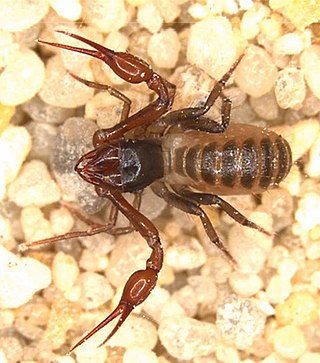
Pseudoscorpions, also known as false scorpions or book scorpions, are small, scorpion-like arachnids belonging to the order Pseudoscorpiones, also known as Pseudoscorpionida or Chelonethida.

Chernetidae is a family of pseudoscorpions, first described by Anton Menge in 1855.

Urodacus is a genus of scorpion belonging to the family Urodacidae. It was described by German naturalist Wilhelm Peters in 1861. The type species is U. novaehollandiae. Its species are native to Australia, and dig burrows. The genus was placed in its own family in 2000. Before this, the group had been a subfamily Urodacinae within the family Scorpionidae.

Anatemnus is a genus of pseudoscorpions.
Synsphyronus is a genus of pseudoscorpions in the Garypidae family. It was described in 1930 by American arachnologist Joseph Conrad Chamberlin. Its distribution is mainly in Australia, but also extends to New Zealand and New Caledonia.

Garypus is a genus of pseudoscorpions in the family Garypidae. It was described by German arachnologist Ludwig Carl Christian Koch in 1873. The species are found mainly in tropical and subtropical areas, where they occupy supralittoral and littoral zones in seashore habitats.
Austrochernes is a genus of pseudoscorpions in the subfamily Chernetinae, first described by Max Beier in 1932. The Australian Faunal Directory decisions for synonymy are based on a 2018 paper by Mark Harvey.
Austrochthonius is a genus of pseudoscorpions in the family Chthoniidae. It was described in 1929 by American arachnologist Joseph Conrad Chamberlin.
Lagynochthonius is a genus of pseudoscorpions in the family Chthoniidae. It was described in 1951 by Austrian arachnologist Max Beier.

Tyrannochthonius is a genus of pseudoscorpions in the family Chthoniidae. It was described in 1929 by American arachnologist Joseph Conrad Chamberlin.
Sathrochthonius is a genus of pseudoscorpions in the family Chthoniidae. It was described in 1962 by American arachnologist Joseph Conrad Chamberlin.

Pseudotyrannochthonius is a genus of pseudoscorpions in the family Pseudotyrannochthoniidae. It was described in 1930 by Austrian arachnologist Max Beier.
Indohya panops is a species of pseudoscorpion in the Hyidae family. It is endemic to Australia. It was described in 1993 by Australian arachnologist Mark Harvey.
Indohya typhlops is a species of pseudoscorpion in the Hyidae family. It is endemic to Australia. It was described in 1993 by Australian arachnologist Mark Harvey.
Indohya damocles is a species of pseudoscorpion in the Hyidae family. It is endemic to Australia. It was described in 2007 by arachnologists Mark Harvey and Erich Volschenk.
Indohya gollum is a species of pseudoscorpion in the Hyidae family. It is endemic to Australia. It was described in 2007 by arachnologists Mark Harvey and Erich Volschenk.
Indohya haroldi is a species of pseudoscorpion in the Hyidae family. It is endemic to Australia. It was described in 2007 by arachnologists Mark Harvey and Erich Volschenk.
Indohya napierensis is a species of pseudoscorpion in the Hyidae family. It is endemic to Australia. It was described in 1993 by arachnologists Mark Harvey and Erich Volschenk.
Ideoblothrus is a genus of pseudoscorpions in the Syarinidae family. It was described in 1892 by Italian naturalist Luigi Balzan as a subgenus of Ideobisium.

Geogarypus is a genus of pseudoscorpions in the Geogarypidae family. It was described in 1930 by American arachnologist Joseph Conrad Chamberlin. The genus has a cosmopolitan distribution.







